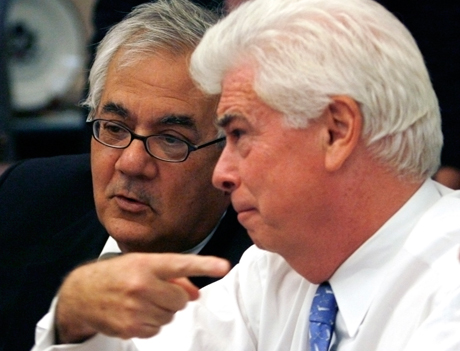
REUTERS/Kevin Lamarque
–Final language for financial reform is more or less done. The marathon 20-hour session that only wrapped up a few hours ago saw House and Senate negotiators run out of paper and conferees fall asleep at the table, but ultimately produced a product that (likely) has the support to make it to the president’s desk by July 4 and (certainly) has the potency to change the face of the U.S. financial sector.
The so-called “Volcker Rule,” the portion of the bill that would ban federally insured firms from trading on their own accounts, got a number of updates last night. Banks will now have two years to wind down their proprietary trading activities and what constitutes those trades has been more explicitly defined. Republican Scott Brown did end up winning some concessions, but he got less than many expected. Insurance companies would retain limited trading privileges and banks would be able to invest 3 percent of their equity in hedge/private equity funds.
A fierce battle over Blanche Lincoln’s strict derivatives regulation was what pushed negotiations into early morning. With a handful of centrist New York Democrats threatening to pull support, conferees forged a compromise that would allow banks to trade derivatives deemed to have value in hedging against their losses — instruments such as interest rate and foreign exchange swaps would be allowed, while making bets on commodity or energy futures would be forced into separate operations.
The final cost of implementing the bill was estimated to be roughly $20 billion; Democrats tacked on a corresponding assessment on the financial sector designed to pay for the legislation in full, with the largest and riskiest institutions forced to pony up the most money. Final votes in the House and Senate are expected next week. Dodd will get his legacy wish.
Assuming final passage, the 111th Congress may well go down among the most prolific sessions in history. It is still unclear if Democrats can match their record of passing sweeping legislation with successes in selling the public on those reforms. The stimulus and health care have proved difficult challenges on that front, but financial reform is likely a different beast — it was more popular from the outset, and gives Democrats a populist deliverable to trumpet on the march toward November.
–In an impromptu statement to the press this morning, Obama said he was “gratified” by the deal struck on financial reform. If the central argument of his 2012 re-election effort is to be domestic reform efficacy, he’s building quite the resume.
–Among Obama’s key meetings when he heads to Canada later today for the G20 economic summit is a sit-down with China’s Hu Jintao. Currency issues are likely to dominate those discussions, but austerity remains the central theme of the confab overall.
–Felix Salmon turns his eye to international financial regulation and argues that it’s a pivot Obama needs to make ASAP:
It’s in Basel, not Washington, that the most important constraints on the global banking system are going to be enacted. And pushing the rest of the G20 to get tough in Basel should be at the top of Barack Obama’s to-do list this weekend.
–And Clint Webb for Senate:
[youtube=http://www.youtube.com/watch?v=8gwr8KJO0Fc]
What did I miss?
You can contact Adam at swampland@time.com.

